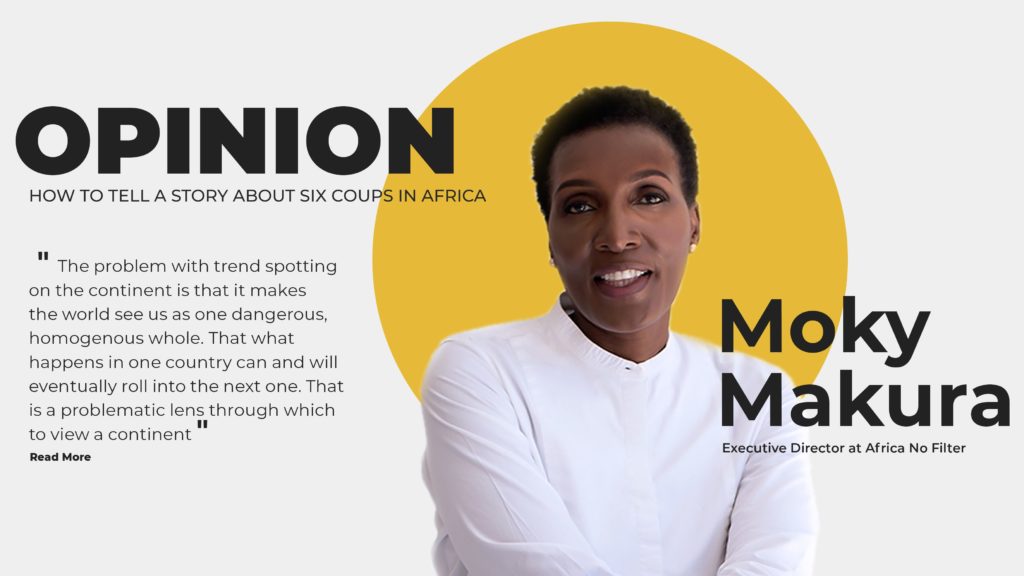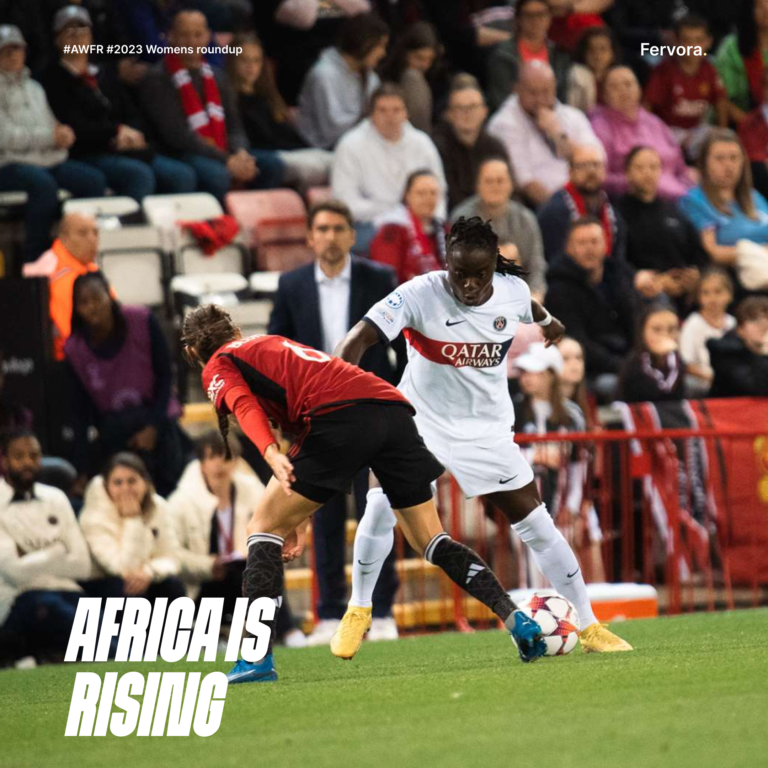In “How to tell a story about six coups in Africa”, Moky Makura, Executive Director of Africa No Filter, discusses the need for accuracy when it comes to writing about Africa. This is the first in a series of bird OPINION pieces, featuring African influencers.
(Disclaimer: Africa No Filter is the funding organisation behind bird story agency.)
by Moky Makura for bird story agency

Last year two influential global media outlets; the Wall Street Journal and The Financial Times both featured stories about a growing trend on the continent; coups in Africa. This year, more media and commentators have joined them including UN Secretary-General Antonio Guterres’s who dramatically proclaimed that Africa was experiencing “an epidemic of coup d’états” in response to the 6 coups in 5 African countries that have occurred in the last 18 months.
The problem is not just that the headlines lack supporting data – the number of successful military coups on the continent has actually decreased from nine in 2013 to six between 2021 and February 2022. The problem is that in looking for trends, we avoid unpacking the real issues that underpin each induvial coup. Instead, we focus on clever data, headline-grabbing proclamations and simplistic analysis that lacks all important context and nuance. How do you even begin to write about one coup in 500 words – the average length of a news story – let alone six.
But there is another hidden impact to the blending together of Africa’s coups. When readers of the two influential global media outlets were asked how they interpreted headlines like: “Military Coups in Africa at Highest Level Since End of Colonialism” and “Failure of democracy: Why are coups on the rise in Africa”, a quarter of the readers assumed that there were more than 45 military coups in Africa in 2021.
The temptation to oversimplify a story or look for common themes to create a trend across the continent says more about the writer’s desire to feed the ‘Africa is broken’ narrative, than a need to unpack a nuanced, contextualised story of events happening in one country. The assumptions that arise from this practice is fed by the persistent homogenising of the continent in the headlines and the stories themselves.
It was the same in 2014 when Ebola emerged in four West African countries: Guinea, Sierra Leone, Nigeria and Liberia. With headlines like “Emergency Efforts in Africa to Contain Ebola as Toll Rises”, many likely cancelled trips Kenya, South Africa or Egypt for fear of catching the disease.
A 2019 report by the University of Southern California highlighted how poorly Africa is depicted in the US. It revealed that Americans seldom see mentions of Africa or Africans on TV entertainment shows or in the news. When they do, the portrayals are often negative and stereotyped. According to the report, most mentions of Africa (43%) appeared on national or local news. After politics (32%), crime received the most mentions (16%), while business and the economy accounted for just 8% of news coverage.
With the current framing around the ‘epidemic of coups’ narrative that is emerging, it is unlikely that Americans or Europeans are aware that in 2021, 50 African countries (over 92%) did not experience a coup. “Not” being the word to pay attention to in that sentence. There were 13 democratic presidential elections in the same year, and the continent continued to be home to some of the world’s fastest-growing economies.
Facts matter, as they provide the all-important context which gets downplayed in stories about coups in Africa. Whilst the coups in Mali, Chad, Guinea, Sudan, Burkina Faso and Guinea Bissau are concerning, they are not the norm on the continent, or in the West African region as the headlines would imply.
The University of Illinois researched coups between 1945 and 2019. Bolivia, Haiti, Syria, Thailand and Argentina were in the top five with 16, 15, 13, 11 and nine successful coups. The only African countries on the top 10 list were Burundi, with eight – the same number of coups as Panama, Ecuador and Afghanistan.
While it’s true that coups are a threat to democracy, they’re not taking Africa back to the heydays of military takeovers as some commentators suggest. If anything, they are taking the continent back to the heydays of colonialism with the US, China, Russia, France, and the European Union being asked to intervene in what are essentially domestic matters.
In January 2021, America experienced what some called an attempted coup when Donald Trump’s supporters violently stormed the United States Capitol to stop Congress from certifying Biden’s win. The world stood by and looked at it for what it was – a domestic issue, driven by popular discontent, playing out globally.
Similarly, African countries that have experienced coups have their own domestic issues. The difference is that in their case, the media, world leaders and commentators are spending time looking for themes and headlines that feed the usual tropes we have come to expect about Africa.
Trendspotting is a popular pastime for those looking to predict behaviour, but the problem with trend spotting on the continent is that it makes the world see us as one dangerous, homogenous whole. That what happens in one country can and will eventually roll into the next one. That is a problematic lens through which to view a continent that needs to reposition itself as a viable destination for both development and business investment dollars.
Like the well-known saying that offers up a suggestion on how best to eat an elephant, the only effective and fair way to tell the story of six African coups is one coup at a time.
Moky Makura is the executive director of Africa No Filter a donor collaborative working to shift stereotypical and harmful narratives within and about Africa. They do this through research, advocacy, community building and grant-making to storytellers and media platforms. Follow her on Twitter @mokymakura.
<script src=”https://bird.africanofilter.org/hits/counter.js” id=”bird-counter” data-counter=”https://bird.africanofilter.org/hits/story?id=620d2b1f93f7410687288768&slug=opinion-how-to-tell-a-story-about-six-coups-in-africa” type=”text/javascript” async=”async”></script>




